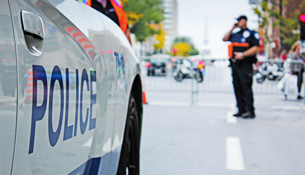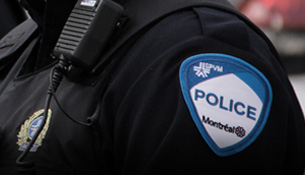
Alarms
Police Officers from the Service de police de la Ville de Montréal respond to nearly 30,000 alarm calls every year.
95% of these calls are false alarms.
The consequences of this situation are a concern:
- The SPVM spends significant amounts responding to false alarms
- The time officers spend on these calls cannot be dedicated to other types of intervention (such as crime prevention programs)
What is a false alarm?
A false alarm occurs when it is triggered unnecessarily due to improper installation of an alarm system, a malfunction, poor maintenance, incorrect handling, or any other negligence that could interfere with its operation.
What is a “burglar” alarm?
A burglar alarm is triggered by an automatic mechanism, whether or not it is connected to a monitoring center, that detects noise, movement, or a break-in. This includes alarms triggered by a mechanism known as a “panic button” used to signal the presence of a burglar.
What is an “armed robbery” alarm?
An “armed robbery” alarm is an alarm triggered by a person to inform a monitoring centre that an armed robbery is underway.
Alarm dispute?
For any dispute regarding an alarm, please contact SPVM's SAGA section at saga@spvm.qc.ca.
Administrative fees
False alarm calls may involve administrative fees.
Rates in effect
(non-taxable)
• Commercial armed robbery:
- 1st call: $430
- 2nd call: $603
- 3rd call (and subsequent): $866
• Residential burglary:
- 1st call: N/A
- 2nd call: $96
- 3rd call: $146
- 4th call (and subsequent): $191
• Commercial burglary:
- 1st call: N/A
- 2nd call: $191
- 3rd call: $286
- 4th call (and subsequent): $380
Method of payment
It is possible to pay the bill at most financial institutions, online or by mail. Payment instructions can be found at the back of the bill.
Note: In all cases, the bill is required.
For information, you may:
• Contact your alarm company
• Call the SPVM Section SAGA at saga@spvm.qc.ca
Frequently asked questions
How many false alarms can we have before being billed?
For commercial and residential burglar alarms, a bill is issued on the second false alarm. For armed robbery alarms, a bill is issued on the first false alarm.
If fees are only charged on the second false alarm, why did I receive an invoice for our first false alarm?
You probably received an invoice for a commercial armed robbery alarm, which is charged even for the first false alarm.
I thought I would only be charged for the third false alarm.
Fees have been charged for second false alarms on residential or commercial burglar alarms since the adoption of By-law 128, in 1997.
I received a fine for a second false alarm, but my last alarm was last year.
Our system calculates the year beginning on the date of the first false alarm. False alarms are removed from the file one year after they occur.
How long do I have to pay the bill?
You have 35 days to pay.
Will interest be charged if I do not pay my bill on time?
Interest will be charged at an annual rate of 9% after the due date.
I received a non-payment letter, but the cheque I sent has already been cashed.
Please call Service des Finances de la Ville de Montréal at 514 872-3867 for this or for any other questions concerning interest charges or your account balance.
I was charged for a false alarm, even though I was actually robbed. Why?
If you were the victim of a break-and-entry, an attempted burglary or a misdemeanour that triggered your alarm system, please called 911 to file an event report, even if you do not plan to submit a claim with your insurance company or if the is no fees attach to your file.
If you already have an event number, please contact us by email to provide us with your client number or address and the event report number. An analysis of your file will be carried out and we will inform you of our decision as soon as possible.



